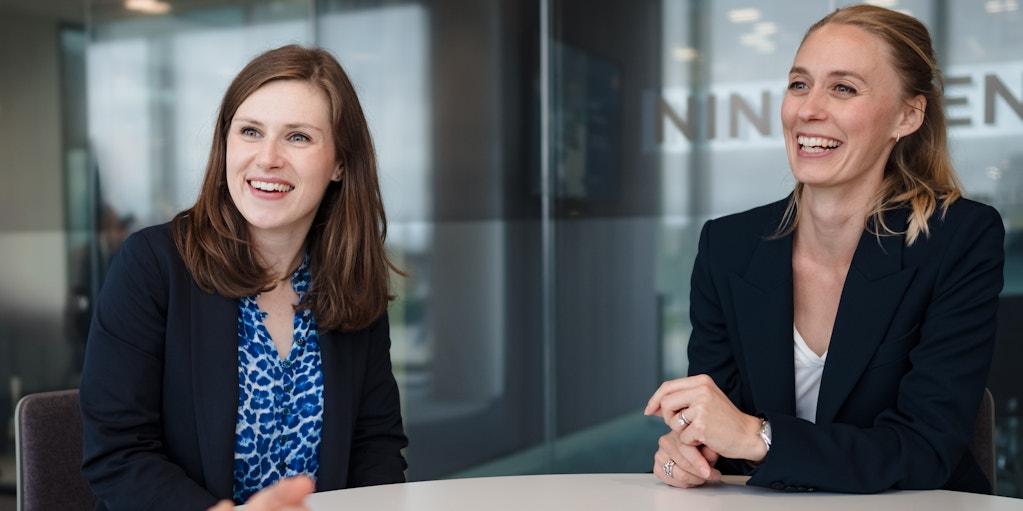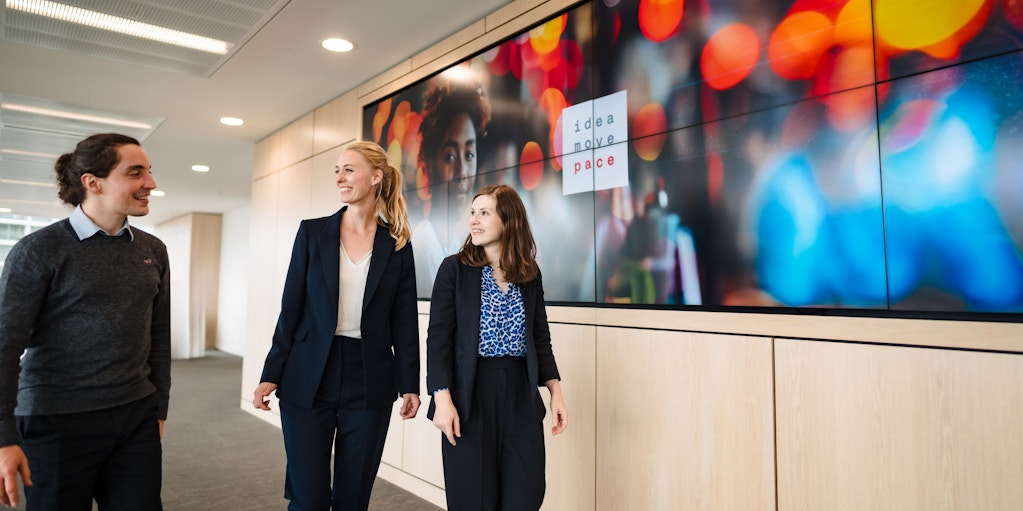
15 minutes with: Anna Chapman
Tags
Our experts are at the forefront of bringing ingenuity to life for our clients. They accelerate new growth ideas from concept, through design and development to commercial success. And they revitalise organisations with the leadership, culture, systems and processes to make innovation a reality.
In this series, you’ll meet some of the brilliant minds creating change every day.

What is your background and how did you come to PA?
I joined PA four years ago, and I’ve absolutely loved it. I’ve worked on a huge variety of projects, starting with the COVID-19 vaccination deployment programme, where I provided data and reporting to help senior leaders make operational decisions. Since then, I’ve worked with organisations including the police, Home Office, and most recently His Majesty’s Courts and Tribunals Service, to help leaders navigate key strategic shifts affecting the justice system.
How would you describe your job to someone you’d never met before?
I tend to say that I work with public sector organisations to help them deliver the best possible services, now and in the future. It comes right back to my purpose and strong sense of wanting to make society a better place for everybody. Operational public service departments are very large, and very focused on frontline delivery. Working with leaders to build the capabilities they will need in the future is really important in creating more resilient public services, and ensuring frontline staff can continue to deliver the best possible services.

What’s different about working at PA?
Working with PA teams is totally different; they are really kind, engaging, technically skilled, and always go the extra mile to help teams turn strategy into action and deliver value. That’s why I chose to join PA.
I also love the variety that working at PA offers. I like working in the uncertain problem space, helping organisations think through big strategic shifts like AI. How do you get a grip on that? How do you put the right box around it? How do you make decisions and set the direction on where to go next?”
I’m brought into projects at the point in time when my skillset is most valuable, which keeps me energised and means that I get to work across a wide range of organisations.
What’s the role of ingenuity in the work that you do?
I often help clients with problems that they’ve never seen before, and that other organisations haven’t seen either. The role of ingenuity is in creating a path through new and uncertain environments, drawing on parallel experiences to come up with new ideas. Take AI. Following a step change in the technology about two years ago, most popularly recognised by the launch of OpenAI’s ChatGPT, people have been running to catch up and manage the impact of AI on their organisations.
In supporting clients to develop their strategy for AI adoption, I’ve drawn heavily on my experience from previous digital transformation work, because I feel the challenges are very similar. Ingenuity is the ability to connect the dots between different experiences and pull it all together into a practical way forward for our clients.
How has your work changed in recent years?
I started my career around 10 years ago, when big data was becoming ‘a thing’. The focus was on making more data-driven decisions and understanding the role of analysts within an organisation. Lots of analytical functions were created and established.
Today, AI is transforming how everyone carries out their roles, with wide-reaching impacts beyond technology and analytical directorates.”
Public services are in a tight financial situation, and a lot of services have become reactive as a result. AI offers a huge opportunity to increase productivity. This has come at the right time for our public services – it’s exactly what’s needed to move towards more proactive service delivery.

What’s most exciting you in your area of work right now?
The recent general election in the UK, regardless of your political beliefs, has been an opportunity for many departments to reset. With a long-term remit, you can think differently about the future of our public services, and we have a chance to do something really transformative. Over the coming months, we’ll see departments release strategies that set a new long-term direction, supported by multi-year investment through the upcoming Spending Review.
I think AI adoption will be a key enabler for many departments over the next few years. Senior leaders have spoken excitedly about AI, but haven’t yet gotten under the surface of how AI can address operational challenges and help to meet strategic objectives.”
I’m excited to see responsible AI become a reality for our public services.
What are your future aspirations for AI in the public sector?
Much of the current debate on AI is focused on how tools like Microsoft Copilot can be used to increase productivity, reduce administrative effort, make people’s day jobs less mundane, and free up time to focus on complex tasks. In fact, the National Audit Office recently did a survey on AI across the public sector and found that 30 percent of routine tasks in the civil service could be automated with AI.
For me, the bigger opportunity is how we embed AI into real-world, real-time services to deliver better outcomes for the public: using advanced analytics to help staff make more informed decisions and early interventions; enhancing how we carry out operations (for example through the use of facial recognition and advanced surveillance systems); and mitigating the impact of nefarious use of AI by our adversaries.
Adopting AI successfully and responsibly across mission-focused departments will require a clear strategic approach.”
Having the right structures in place to support innovation is needed to move successfully from proof of concepts to AI at scale, including engaging with partners across academia and industry to focus R&D activity in support of public sector objectives. The right governance and assurance will also be critical if we are to build trust in the use of AI in government operations and decisions.
We need to bring all these elements together to put AI into practice, rather than talking about AI as a mystical thing that will just happen. To realise the benefits, you’ve got to make it real.

What projects are you most proud of, past or current?
What’s nice about consulting is that you get so much variety from the problem itself, the group of clients you work with, the sector, the PA team, and your own career development. There’s always something you can gain from each project to draw on in the future. The COVID-19 vaccination deployment programme taskforce was a once-in-a-generation project that I was hugely proud to work on. I worked in the data and analytics function, providing senior leaders with data-driven insights on vaccination uptake throughout the duration of the programme to help them identify where interventions were needed to support the countrywide rollout of vaccines quickly, safely, and equitably. In crisis environments, decision-making loops become much quicker, and it was a great example of how data can be used to drive decisions at pace. I’m very proud to have worked in that team.
Another highlight was my work to develop the first national Police Science and Technology Strategy with the Police Chief Scientific Adviser. It was the first project at PA where I was in the driving seat – leading the project design, coordinating the team, and managing client engagement. It was a big learning curve, and one of the projects I have learned the most from. The strategy has since been published, and it’s always nice when something you’ve worked on is out there in the real world because you can really see its impact.
What advice would you give to someone who wanted to follow in your footsteps?
For people thinking about moving into consulting, I’d say give it a go, because it gives you a chance to really make and drive change, set the agenda, and push things forward in a way that perhaps you wouldn’t be able to within an organisational hierarchy. Equally, I would definitely advise people to spend some time getting hands-on experience of what it means to work in a big organisation at the frontline of public services. That’s really valuable.
It gives you more empathy, emotional intelligence, and experience to bring to the recommendations you provide.”
For me, it’s about bringing it back to what you want to achieve, and the best way of getting the experience so you can maximise your potential.

What are your future goals, professionally and personally?
I’m currently completing PA’s Women in Leadership programme, so I’m trying to be more reflective and understand who I am as a leader. It’s exciting to have the opportunity to grow and expand my network, lead teams, and mentor other people as I develop at PA.
Beyond work, I’d love to do more volunteering. One of the great things about working in the Justice and Home Affairs sector at PA is the opportunity to get involved in supporting third sector organisations across the justice system through The PA Foundation. One of the charities we support is StandOut, which helps people make positive change, realise their potential, and rebuild their lives after prison. I’ve volunteered in prison to help people with mock interview practice in preparation for getting a job on release, a hugely inspiring and rewarding experience. I’d like to be able to spend more time doing charity work in the future, including helping organisations set clear strategies to deliver their mission.
What are you looking forward to right now – work related, or outside of PA?
This interview is one of the last things in my calendar before taking three weeks off for my wedding. It’s been a busy year of planning and I can’t wait to see it all come together on the day.
Explore more









